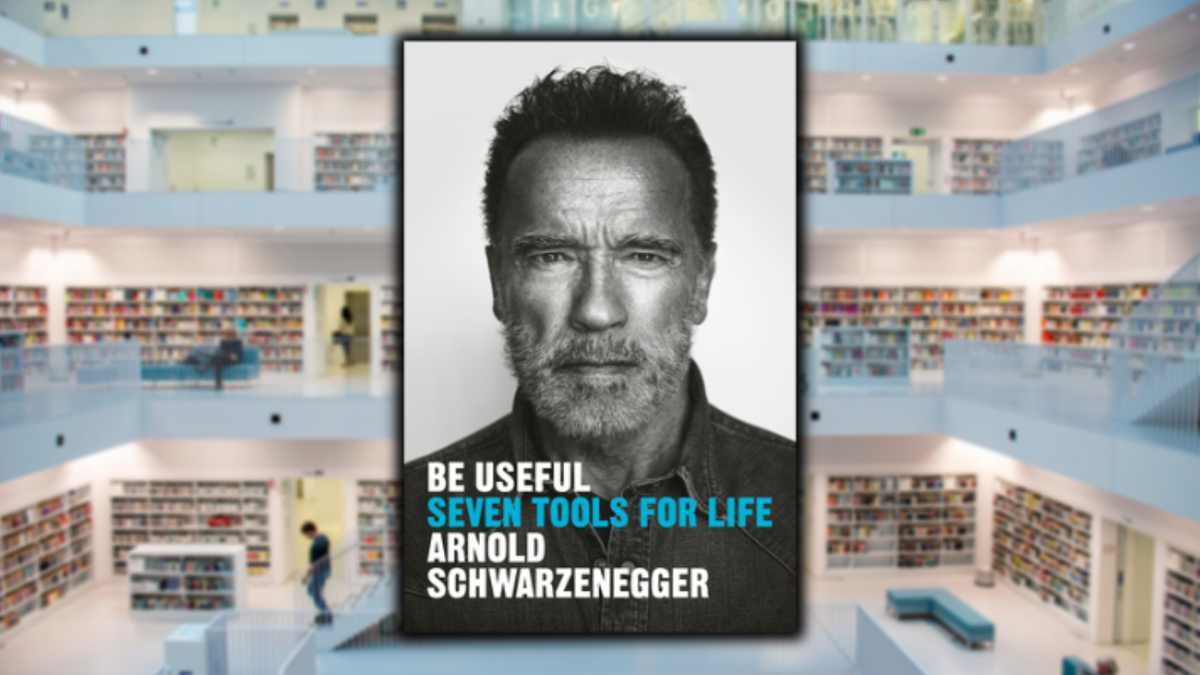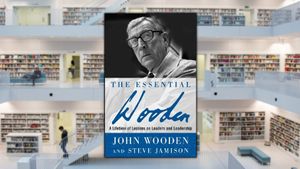
This Book is For:
*The dreamers and the visionaries who can't sit still, who know that there's something more to life, and that it can be found just outside the confines of one's hometown and the borders of one's comfort zone.
*Athletes and businesspeople who want to get inside the mind of one of the greatest competitors and achievers who has ever lived, and find out how they can bring some of that same potency and drive into their own life and work.
*Young people who are just starting out, are still living inside their origin story, and who want to get an idea of what's possible for them, what the world needs, and how they can contribute it.
*Ambitious people everywhere, always striving for more, who want to get inspired by the crazy life story of some restless Austrian kid who knew exactly where he was going and who didn't stop until he got there.
Summary:
“It’s not hours in the day you lack, it’s a vision for your life that makes time irrelevant.”
Arnold’s book is the most Schwarzenegger thing I’ve ever read in my life. I mean that in a good way, of course.
It’s full of his big personality and he doesn’t tone anything down (like he ever has), the result being this compulsively readable book, full of great life advice and inspirational passages. It’s motivating as hell, and I tore through it like I was ripping a phone book in half!
There’s a lot in the book about vision, and the supreme importance of having an overwhelmingly clear, specific idea of how you want your one and only life to unfold.
Not only that, but he backed up his vision with massive action, working out twice a day for hours on end (probably overtraining, but whatever) and then attending school, going to work laying bricks with his best friend and fellow bodybuilder Franco Columbu, or heading off to acting classes in the evening.
His path was not without obstacles, of course. None of us can claim that. Every single one of us will face people in our lives who either don’t believe in us or actively want us to fail. Not everyone is going to believe in your vision, no matter how strongly you believe in it.
Arnold says that you can either use the naysayers you’ll inevitably meet on the path to your goals, or you can ignore them, but you can never, ever listen to them.
They are roadblocks, and you can either go around, above, or through, but you can never turn back. Not from your vision.
Your vision should be so clear and energizing - almost literally like a photograph in your mind of where you’re going, what it will look like when you get there, and how you’ll feel when you arrive - that it will inspire you to hold onto that vision and never let it go.
Arnold can also be very funny, and the Governator’s got jokes for sure. I’ve always laughed a little whenever he advises people to “sleep faster” in order to leave more time in the day for accomplishing their goals.
Another thing that cracked me up a bit was where he was talking about the various kinds of training and acting classes he was taking once he got to Hollywood and how he wants his money back for his “accent removal classes.”
Be Useful is full of empowering, strong messages from someone that people can look up to for a whole host of reasons; and Arnold, in my opinion, is just one of those guys who is exactly who he says he is.
He's a brutally hard worker - often lifting more than 40,000lbs per workout, morning and evening - and an aspirational role model who isn’t afraid to step forward in life and say “I am.”
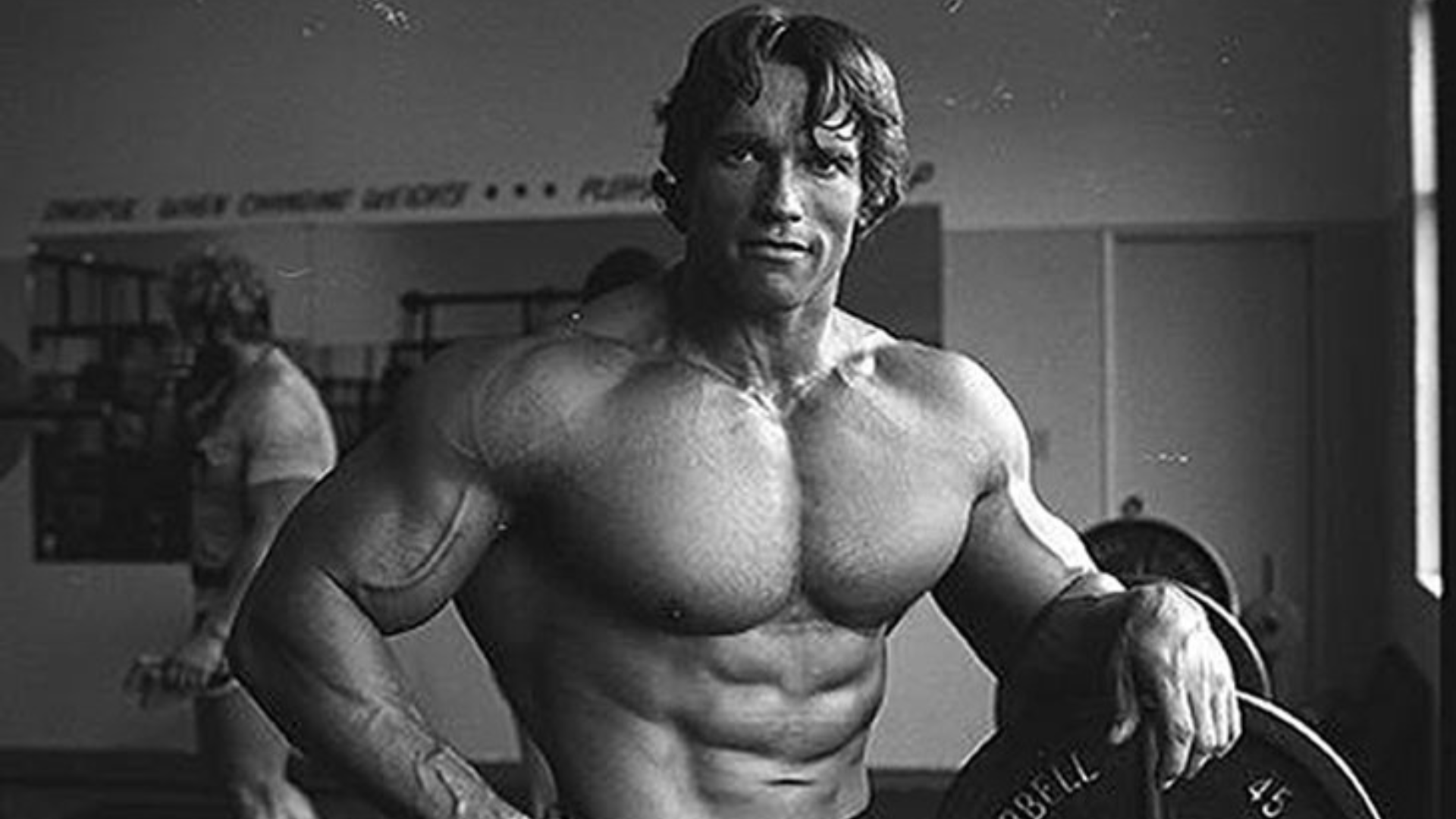
Key Ideas:
#1: The Single Idea That Shaped Arnold's Life
“If you don’t get to experience what it feels like to push yourself, to do more than you thought you were capable of, and to know that the pain you put yourself through will lead to growth that you alone are responsible for creating, then you will never appreciate what you have the way that same thing is appreciated by someone who earned it, who worked for it.
Work works. That’s the bottom line. No matter what you do. No matter who you are. My entire life has been shaped by that single idea.”
Money can make you happier, especially when you use it to remove the sources of unhappiness. But have you ever noticed how unearned money tends to make people miserable?
It's the same story with the lottery winners whose lives become worse than before, or the children of billionaires who feel lost and without purpose, with nothing to struggle and strive for, nothing to achieve.
The same principle is at work in all of our lives, and I can tell you from personal experience: when you work so hard for something; when you give so much of yourself in pursuit of something you desperately wanted...and you actually get it?
It's one of the best feelings ever. It's damn near indescribable. But the people who aren't forced to work for what they have are deprived of the opportunity to experience it.
There is nothing you can do to feel this way, besides the work that it will take. There is, literally by definition, no shortcut to the feeling of getting something you've worked unreasonably hard for.
Arnold says that his entire life has been shaped by that one idea, and I feel the same way. I don't appreciate things that I haven't worked for, and I do almost feel sorry for people who have never felt what it feels like to give everything for their dream. Freedom feels amazing, no matter what. But earned freedom feels even better.
#2: Failure is Safer Than Quitting
“Failure has never killed a dream; quitting kills every dream it touches.”
Arnold used to say, "Look at it, there's the ground. That's as far as you can fall!" Hearing him say that changed my whole perspective on failure. You see, failure is temporary, but quitting lasts forever.
He also used to say that falling down doesn't make you a failure. Staying down is what makes you a failure. Looked at in this light, it's literally impossible to fail. Just don't quit! Don't quit and you can not fail.
Of course, it's not always that simple. "The floor" can be an awfully long way down, and you can't always just "dust yourself off" and try again tomorrow. You can very easily get knocked down to the count of 9, but even if you feel as though you're a failure...if you're on your way up, you're still in the game.
Another objection is that you shouldn't foolishly persist in error. If something isn't working the 100th time you do it, maybe it is time to give up and try something else. Or at least modify your approach.
But still. Every setback or adversity contains the seeds of an equivalent or greater benefit, and you'll find that the biggest winners in this world have also failed just as spectacularly on their way to the top. You can't avoid it, so you may as well just get better at it, and spend less time on the floor each time you get knocked down.
#3: Set Big Goals (No, Bigger Than That!)
“If you only go for the smaller goal, the big goal is automatically out of reach.”
The psychology of attacking a huge goal is completely different than that of tentatively approaching a smaller one.
It quite literally opens up new possibilities. Opportunities and paths you've never considered before will start to extend before you, and things you never even considered before will appear in consciousness. It's a totally different way of seeing.
We see what we're looking for, and so if you only look for ways to achieve a small little goal, you're going to completely miss your chance of noticing a path to a larger one.
You can put it this way: ask bigger questions, get more expansive answers. Asking how you're going to 10X revenues this quarter will shift you into a completely different mode of thinking than if you were just looking for ways to eke out an incremental 2X increase.
Another benefit is that even if you "fail," you're still going to be further along than you would have been had you only pursued the smaller one. Maybe you won't be able to 10X your revenues, but even making the attempt, taking bigger swings makes it more likely that you'll at least hit something like 5X or 7X.
Turns out, that lame poster hanging up in your school classroom was right: Shoot for the moon. Even if you miss, you'll land among the stars.
#4: Have a Clear Vision
“The picture in my mind was so clear you could have put a frame around it and hung it on a wall.”
I saw myself with my hands raised in victory way before it ever happened.
I'm speaking about my last heavyweight fight, where I won by unanimous decision over an opponent with several times as many fights as I had. He was way more experienced, and definitely favored to win. But I saw my victory in the theater of my mind weeks before I ever stepped into the ring that night.
You possess the same power of creative visualization. So does Arnold, so do we all. Every great achievement happens first inside the mind, before anyone ever sees it expressed in reality.
None of this is to say that you can just close your eyes and "imagine" yourself winning without then opening your eyes and doing some incredibly hard work. But you have to see it first.
It has to be real inside the theater of your mind, after which all the effort you put in will go to pulling it out of you and planting it in the external world. It's not magic, it's just vision and work.
For more on this, I highly recommend reading my breakdown of The Answer, by John Assaraf, but for now, consider what Arnold has to contribute here:
“There are reasons and explanations for all the things that have happened to us up to this point, good and bad. But for the most part, it wasn’t because we didn’t have a choice. We always have a choice.
What we don’t always have, unless we create it, is something to measure our choices against.
That is what a clear vision gives you: a way to decipher whether a decision is good or bad for you, based on whether it gets you closer or further away from where you want your life to go.
Does the picture you have in your mind of your ideal future get blurrier or sharper because of this thing you’re about to do?”
#5: Burn the Boats
“Plan B is to succeed at Plan A.”
The only thing that having a Plan B does for you is distract you from Plan A.
There's another excellent book by Matt Higgins called Burn the Boats where he explains this idea beautifully.
The name of the book comes from the practice of various conquerors throughout history who would literally burn the boats they arrived in (so the stories go) so that their soldiers would have no option to retreat. It was either find a way to win, or die.
That's the kind of mentality you need to have when things start getting difficult, you're in the middle of a tough journey, and you start having doubts about whether or not you can make it.
You can, but not if part of your mind is seduced into thinking that there might be some other escape route. In reality, the only way out is through. You've just gotta burn the boats and go for it.
Doing so just turns on some other part of you - some part that refuses to give in, that will fight like hell to get what you truly and honestly desire. It's also why some military generals in the past (and probably most nowadays) always leave their enemies at least one pathway of retreat.
If they don't, and the enemies sees that there's no way out except to repel the invaders, they're going to fight like hell - accessing that deeper part of themselves - and the invaders don't want that.
Arnold's story teaches us that we can't ever afford to offer ourselves a way out; it'll only dilute your efforts and divide your will against itself. No. You choose one main spot of attack, you throw every single thing you have within you at that one spot, and you keep hammering until that spot cracks right open.
#6: The Little Idea That Exploded
“Before you can achieve your goals, I think you need to express them. Share them. I think you need to admit to yourself, and communicate to others, that this thing that started in your mind as a little idea has exploded into a massive dream with huge potential to benefit your life and theirs.”
There are two ways of thinking about whether or not you should share your goals with others, for and against.
Personally, I lean towards sharing your goals with others, especially within a supportive community, wherein you can gain support and encouragement from your friends and allies who want to see you win.
No one is self made (Arnold even says so himself in his foreword to Tim Ferriss's book, Tools of Titans), and it takes an entire community to construct a winner.
Not only that, but expressing your goals makes you accountable to the group, and letting down the people who care about you and are relying on you feels so sickeningly awful that you'll gain the inner strength and motivation to succeed.
It may be uncomfortable to put yourself and your reputation on the line like that, but that's good! It should make you uncomfortable. As Arnold always taught, when you're uncomfortable, that's when you grow.
But on the other hand, announcing your goals in public can sometimes attract the attention to enemies and, well, jerks who would love to see you fail (and would happily ridicule you if you did).
That's a legitimate concern, and if you're the type of person who has difficulty focusing on their own path when others speak up and try to knock you around, that whole cacophony of critics can be a real dream destroyer.
In the end, there's merit to both approaches, and you'll have to decide for yourself whether or not to keep your goals to yourself and build in private. For what it's worth, however, it's Arnold's opinion (and mine) that dreams deserve to be expressed, and gain tremendous power and force when they are.
#7: How Could You Sleep?
“And while I was definitely physically exhausted, mentally I was totally switched on. I was excited and energized, because I’d just spent two hours moving closer to achieving my vision. How could you possibly expect me to sleep at a moment like that?”
This is one of my favorite passages in the entire book. I don't have a lot of commentary to add here, just that I wish for everyone to be able to experience this same kind of pure joy in living, striving, and achieving that Arnold is expressing here.
I've felt it, he's felt it, you probably have too, at least a few times in your life - it's a glorious state to inhabit, a wonderful way to go through life, and I believe that the rest of your life begins when you've found that thing you'd gladly give up sleep for.
#8: The Beauty of Pain
“That’s the beauty of pain. Not only is it temporary, which means you don’t have to deal with it forever, it tells you whether you’ve begun to give enough of yourself in pursuit of your dreams.
If the work of being great or achieving something special hasn’t hurt or cost you anything, or at least made you uncomfortable, then I’m sorry to be the one to tell you, but you’re not working hard enough.
You’re not sacrificing all that could be sacrificed in order to be all that you could become.”
In Dante Alighieri's The Divine Comedy, as Virgil, his guide, is leading him through all the circles of Hell, Dante learns that the exit is located at the very center. The only way out is through.
Similarly, the "pain period" that Arnold describes refers to that point in the set when you're lifting and the muscles start to fill up with lactic acid, everything starts to hurt, and you don't think you have even one more rep left inside.
Except, you actually do. Not only can you continue, but you must continue if you want your muscles to grow. Muscle growth is an adaptation to stress. Meaning, you have to overload your muscles - put more stress on them than they're used to - "put them through some shit," basically, if you want them to grow.
If you don't challenge yourself, if you're not able to make it through that "pain period," your muscles aren't going to grow and you won't see any results. The only way out is through.
Everything you want is on the other side of pain and discomfort, and while it's not the only sign that you're putting in the "required number of reps," so to speak, it's usually a pretty good indication of whether or not you're actually doing enough to reach your goals.
Obviously, don't take this too far. It's possible to overwork yourself, just like it's possible to overtrain your muscles in the gym. Except most people never even get close to that. They stopped at 8 reps, because they think that's good enough.
Well, I'm sorry to be the one to have to tell you this, but the cost of being extraordinary is an exacting one, and excellence has a heavy price.
You're going to have to get a little uncomfortable; you're going to have to give up some things; you're going to have to suffer a little bit and make some sacrifices. The only way out is through.
#9: Ignore the Naysayers
“You have a choice with the naysayers you face on the road to achieving your goals. You can ignore them or you can use them, you just can’t ever believe them.”
No one criticizes losers. No one who has dreams bigger than yours is going to take time out of their day to try and drag you down. When you have naysayers and doubters, that's when you know you're onto something.
They're literally irrelevant. Unless, of course, you want to use them for motivation or some extra fire. Even though I tend to agree with the person who said, "the problem with 'f*** you' is that it's mostly about the 'you,'" I'll admit that choosing your enemies wisely can be a smart move.
But the bottom line is that you can hardly hope to avoid criticism unless you're not doing anything of consequence in the first place. Again, criticism means you're on your path.
It doesn't mean never listen to constructive criticism, but always remain in control of your critics. You can ignore them, or you can use them to help you win, but you can't let them live rent-free inside your mind.
#10: Let Them Underestimate You
“When you’re different, when you’re unique, and nobody has ever dealt with someone like you before, they are going to drastically underestimate what you’re capable of. Do not let your ego win. Don’t correct them.
If you can stay focused on winning and on achieving your goals, you can use their doubts and underestimation against them to effortlessly bridge the conversation, or the interview, or the negotiation to whatever you want to talk about.”
Being underestimated is one of the best things you can hope for, especially when you're just starting out and nobody knows what you're truly capable of yet. It's a place of immense power if utilized correctly.
They simply won't be prepared for what's coming, and if you put in the work in silence and obscurity, nobody you're competing against will have any defense against you. Not only that, but people who otherwise would have attempted to block your way will find themselves too late to stop you.
You can shock them with your effort and the skills you've built while hidden inside your own private darkness. Disappear for 6 months. A year. Two years. Whatever it takes, but emerge remarkable - unignorable. On top.
That's what Dorian Yates, the bodybuilder used to do when he was competing in shows. His nickname was The Shadow, because he lived literally an ocean away from all the rest of the Olympia competitors who were all training together, seeing each other at the beach, spying on each other's progress.
He was half a world away, in the basement of this dark little gym in Birmingham, covered up, putting in unhinged levels of effort and focus into dominating that Olympia stage.
Sometimes he'd send pictures every few months to the Muscle and Fitness offices in L.A., but for the most part, he was a ghost, a shadow. Nobody knew what he looked like during the year, nobody heard from him, nobody knew anything about his training or his diet or anything - until he just showed up the show, decimated everybody, collecting his trophy and his prize money, and disappeared again for another year. Like a shadow.
If there's a recurring theme so far, it's that nobody else can somehow, magically "stop" you from achieving your goals. Nothing that anybody says or does while they're too busy underestimating you can prevent you from doing the insanely hard work necessary to do whatever it is you set out to do.
#11: Sleep Faster
“After all this stuff in a typical daily life is accounted for, there are still two hours left in the day to make progress toward your vision.
I can already hear the question coming from a bunch of you: What about time for rest and relaxation?
First of all, rest is for babies and relaxation is for retired people. Which one are you? If you want to do something special, if you have a big dream that you want to achieve, I believe you’re going to have to put relaxation aside for a while.
But fine, you want some relaxation, take half of the remaining time for your little nap. That still gives you an hour each day to work toward your goal. Do you have any idea how powerful an hour a day is?
If you want to write a novel, sit down and write for an hour every day, and aim for just one page. At the end of the year, you will have a 365-page manuscript. That’s a book!
If you want to get in shape, burn five hundred more calories each day than you consume. In one week, that’s a pound you will have lost. In a year, that could be fifty pounds!
How can you burn more than you eat? Try using that leftover hour to ride your bike. Even at a moderate pace, even just five days a week, by the end of a year you will have ridden farther than the distance between Los Angeles and Boston. You will have ridden across the country!
These are fantastic accomplishments that require a lot of hard work. But it’s work that you are more than capable of doing when you’ve planned it out and broken it down into little, daily goals that shouldn’t take more than an hour or two to complete.
Hell, you can even be crazy like me, and it’s still only five hours of work each day. That leaves nineteen hours to do everything else. Eat a little quicker, hit the brakes on your commute a little less, and sleep a little faster, and you’ll have found the hours you need.
So don’t tell me you don’t have time to train, or to study, or to write, or to network, or to do whatever you need to do to achieve your vision. Turn your TV off. Throw your machines out the window. Save your excuses for someone who cares. Get to work.”

Book Notes:
“By the end of 1987, I’d killed 283 people. More than anyone else in Hollywood during that time, by far. It took me eight films, but I did it. And that meant something. It meant that I was an action movie star. My name was above the title of most of my films. In big block letters just like I’d envisioned: SCHWARZENEGGER.”
“This wasn’t a fantasy. This was a memory that just hadn’t happened yet.”
“Life happens as much in the transitions as it does in the poses. It’s all one long performance, and the greater the impact you want that performance to have, the more important each one of those little moments becomes.”
“My final two and a half years in the Capitol, which I spent in the thick of the global financial crisis, felt like being stuck in a clothes dryer with a load of bricks. It was nothing but beating after beating from every direction.”
“From very early on, producers and casting directors were always trying to get me to shorten my name to Arnold Strong or some other such name, because they said Schwarzenegger is too much of a mouthful. It’s too long, they said. What they didn’t know, but that I could see plain as day, was that Schwarzenegger looks fucking great all by itself in BIG letters above the title of a movie.”
“What you can ‘see’ you can ‘be.’"
-Don Macpherson
“If you want your vision to stick, if you want to increase the chances of success looking exactly like you hoped it would when you first figured out what you wanted your life to look like, then you need to get crystal clear on that vision and tattoo it to the inside of your eyelids. You need to SEE IT.”
“Working your ass off is the only thing that works 100 percent of the time for 100 percent of the things worth achieving.”
“You have to remember, my goal wasn’t just to come to America, it was to become part of America. Being in movies was key to that, but there are still walls and walkways standing in Los Angeles that Franco and I built together between workouts fifty years ago that I feel are a part of my legacy, along with my star on the Hollywood Walk of Fame and billboards with my face on Sunset Boulevard.”
“In February 1976, Frank Zane, Ed Corney, and I were asked to pose for a group of art historians and art critics at the Whitney Museum in New York as part of an exhibit called ‘Articulate Muscle: The Male Body in Art’ that Sports Illustrated described as a chance to look at us ‘not in athletic terms but as artists living inside our own creations.’”
“No one who puts a microphone in front of your face and asks you a bunch of questions is doing it as a favor to you.
They have their own agenda, whether that’s finding a way to fill up column inches, coaxing out a controversial statement that gets more attention, or in some cases just trying to make you look like an asshole.
You don’t owe them anything. You definitely don’t owe them the answer they think they deserve. This is your time as much as it is theirs. This is your opportunity to tell your story and sell your vision as much as it is their opportunity to craft whatever narrative interests them.
So take that time and opportunity to bridge the conversation from what they want to hear to what you need to say in order to achieve your goals.”
“People couldn’t believe it. Media outlets across the country wrote stories after the election about my meteoric ascent.
Except I hadn’t ascended anywhere. I’d done hours of prep, I’d rehearsed the jokes I peppered in, I went over and over my talking points until I knew them cold, I had my arms fully around all the policies I felt were most important for the future of California.
In short, I was right where I had always been. It was everybody else who finally got on my level by recognizing what they had been underestimating the whole time.”
“One of the main reasons people voted for me was that I’m not a typical politician with a phony flawless exterior. I’m a normal person who likes to do fun things. Why pretend that the things that got me where I was and made me who I am didn’t happen? All I’d be doing is putting myself in a position to sell the story of someone I don’t know.”
“I have a rule: no complaining about a situation unless you’re prepared to do something to make it better. If you see a problem and you don’t come to the table with a potential solution, I don’t want to hear your whining about how bad it is. It couldn’t be that bad if it hasn’t motivated you to try to fix it.”
“To everybody else, I said get on board or get out of the way, and if you do neither, expect to get worked around or run over. Is there a risk in taking that kind of approach to achieving your ultimate vision? Possibly.
But this is your life and these are your dreams we’re talking about, not theirs. I would argue that doing whatever you need to do to make your dreams a reality and to create the life you want for yourself is worth the risk.”
“The world needs more sponges. It needs more smart, hopeful, driven, useful people with vision. It needs people who can dream up the world of tomorrow, which only happens when people are first able to soak up the knowledge of the world from today.”
“The first thing to realize is that at the simplest, most basic level, you don’t have to rearrange your life to help other people. You just have to keep your eyes and ears open and be engaged with the world around you.
When you see someone struggling - with a bag of groceries or a difficult emotion - stop and give them a hand or a hug.
If a friend you haven’t talked to for years calls in the middle of the night, answer the phone. If there is someone who looks like they might need help, answer the call, whether they asked for help or not. Lighten their burden, even if it’s only for five minutes or fifty feet.
Helping others is a simple practice that requires nothing more than awareness, willingness, and a little bit of effort. Without actively seeking it out, just by being connected to your environment, you will have opportunities every day to help someone else.
And trust me when I tell you, it will make you feel great when you do.”
“I could go on and on listing people who have helped me achieve my dreams and create the life I envisioned for myself beginning all those years ago back in my little village in Austria, but I think you get the point by now.”

Important Insights from Related Books:
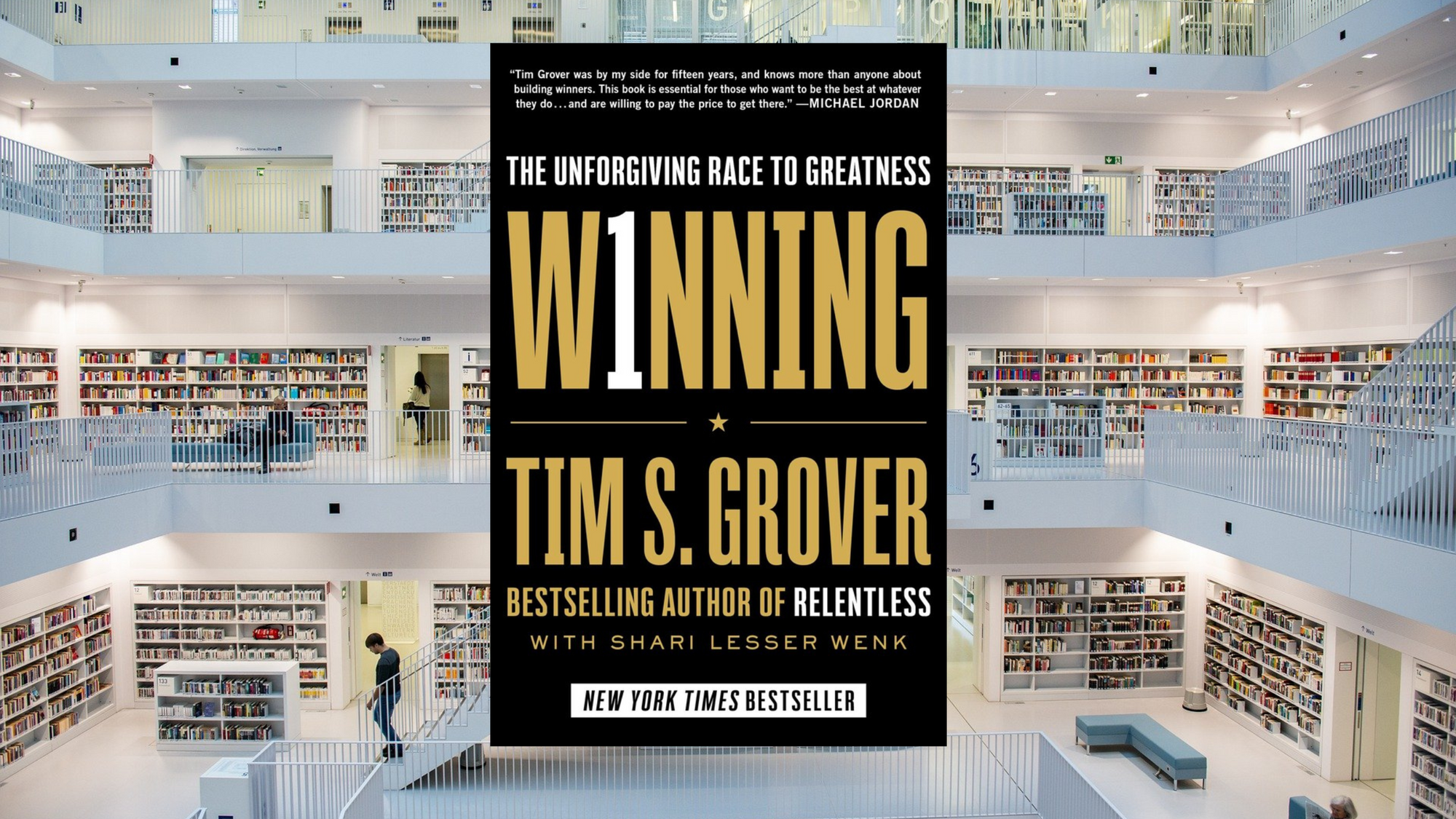
Winning, by Tim Grover:
This book has some of the most “truth per page” of any book I’ve ever read. It's also absolutely not for everybody, in the same way that not everyone is built to compete and win at the highest levels of sports and business.
The reality is that most people just do not have what it takes to succeed at the highest level, and the people who do make it are the ones who have internalized Tim Grover's message in this book. He reminds us - through his words and example - exactly why he is one of the world’s most sought-after mindset experts.
Grover is an elite performance coach with over three decades of experience training the likes of Michael Jordan (who was actually his first client ever), Kobe Bryant, Dwayne Wade, and hundreds of other world champions and Olympic athletes. That's 30+ years of being surrounded by winners - never missing a practice or a game - and refining his approach to the point where it can be delivered at your feet in the form of this truth-studded book.
"Winning isn't everything, it's the only thing," said Kobe Bryant, one of the all-time greats, and here in Winning, Tim Grover distills everything he knows about winning and lays out 13 key principles for achieving unbeatable performance.
Sample Quotes from the Book:
“It’s only one game…until you miss the playoffs by only one game.”
“Winning is not a marathon; it’s a sprint with no finish line.”
"Your mind is your area to dominate, and if you don’t dominate it, someone else will."
Read the Full Breakdown: Winning, by Tim Grover
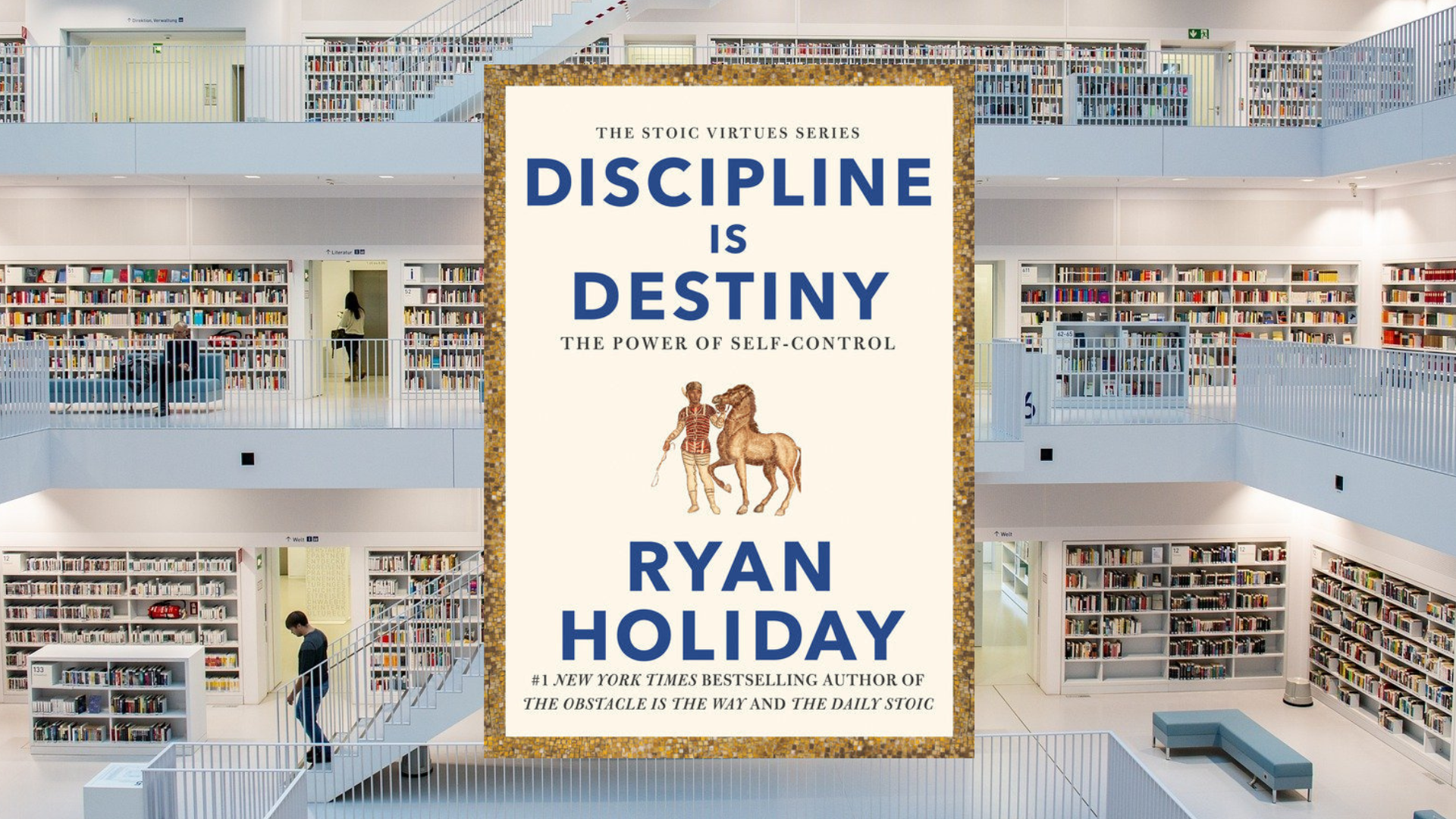
Discipline is Destiny, by Ryan Holiday:
Self-discipline has traditionally been a hard sell. Self-indulgence, quick dopamine hits, and having a good time have been winning the marketing battle lately, similar to the "battle" between chocolate and asparagus. Or between reality television and educational documentaries.
But what if the problem is simply that we've been thinking about self-discipline in entirely the wrong way?
Up until now, self-discipline may have been the equivalent of a Henry James novel in a TikTok world. But Ryan Holiday's book, Discipline is Destiny, will have you reimagining the whole concept in a much more liberating, fulfilling way.
His aim is to teach you how to harness the powers of self-discipline to fulfill your personal destiny. While everyone's destiny is fundamentally different, everyone's destiny is the product of self-discipline. Your habits shape your character, and your character shapes your destiny, so Ryan's book goes right to the root and gives you the physical, mental, and emotional skillsets for success.
In the final analysis, self-discipline is prescriptive. It will show you your future. Your environment, actions, habits, and mindsets are constantly shaping your destiny, and this book will show you how to guide this process more intelligently.
This involves thinking of self-discipline in the "proper" way: not as a punishment, as self-deprivation, but as it really is: a pathway to even greater freedom.
Some days will be hard. Actually, that's not true...many days will be hard. The hard days will outnumber the easy ones, but the meaningful days will also outnumber the meaningless ones. Living this way won't always be easy, but it will always be worth it.
Sample Quotes from the Book:
“At the core of this idea of self-mastery is an instinctive reaction against anything that masters us. Who can be free when they have lost, as one addiction specialist put it, ‘the freedom to abstain?’”
“Think about it: Most people don’t even show up. Of the people who do, most don’t really push themselves. So to show up and be disciplined about daily improvement? You are the rarest of the rare.”
“How much progress could you make if you made just a little each day over the course of an entire life? What might this journey look like, where might it lead, if each bit of progress you made presented both the opportunity and the obligation to make a little more progress, and you seized those opportunities, you lived up to those obligations, each and every time?”
Read the Full Breakdown: Discipline is Destiny, by Ryan Holiday
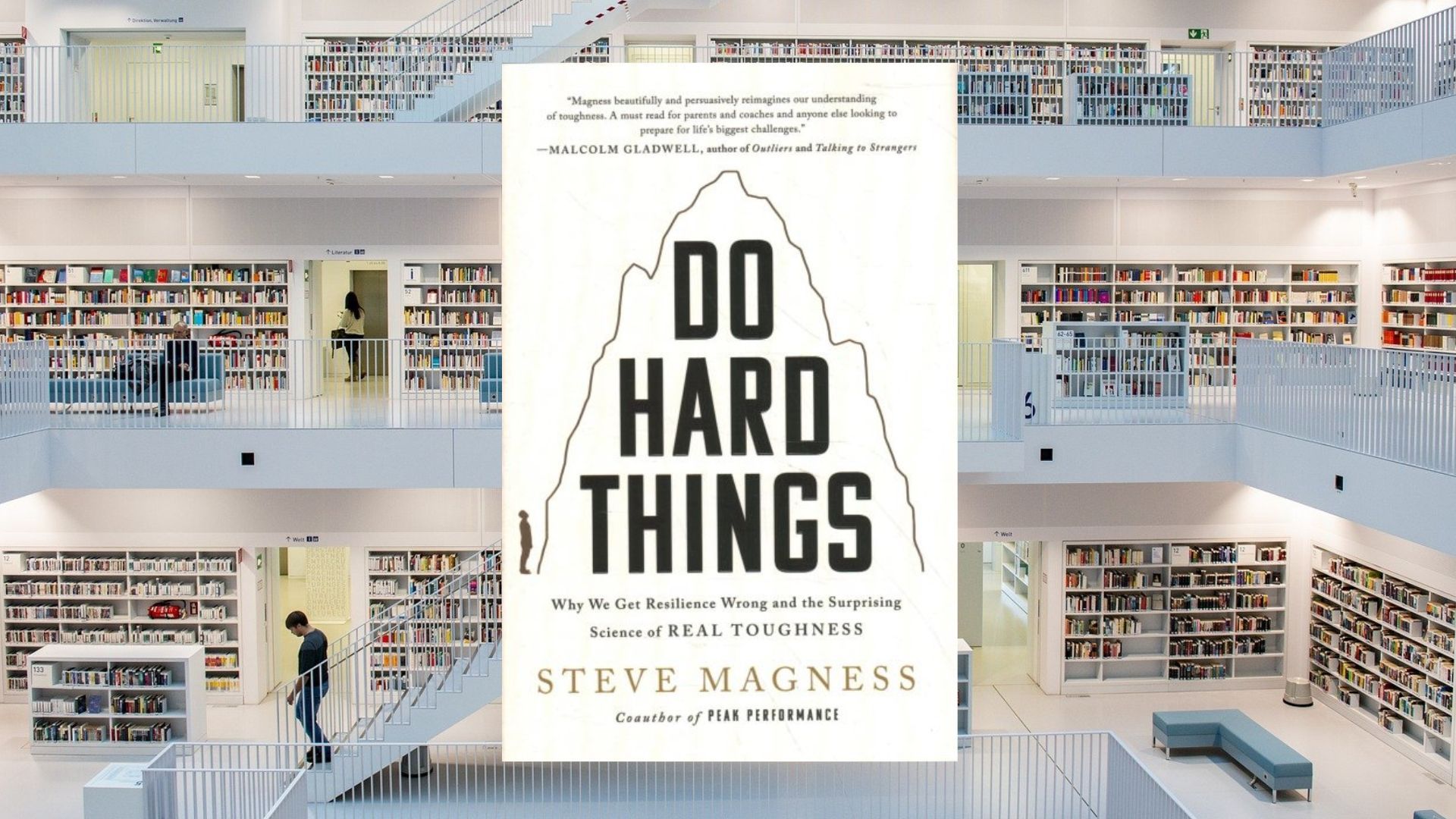
Do Hard Things, by Steve Magness:
We've never really understood the true nature of mental toughness until now.
Before Steve Magness and the pioneering scientists whose research he presents in this book came along, we've seen only one side of it, and this book will show you that there's more to toughness than we usually realize and more inside you than you've ever known.
The old model of mental toughness was based on fear and ridicule, shame and doubt. It was based on hiding all evidence of weakness, and the old style of coaching and leadership involved yelling and screaming at people until they get closer to what we wanted them to be - not for the purpose of allowing them to reach their full potential.
That changes today, and it changes with this book, Do Hard Things.
Steve Magness is a high-performance coach and scientist who works with Olympic athletes and people of comparable ability and prowess, and his book is a compelling and useful attempt to "fix" our old definition of mental toughness and replace it with something more flexible, more insightful, and ultimately, more useful.
Do Hard Things draws from the very latest in science and psychology to teach us how we can work with our body, emotions, and feelings, and how we can shift the very meaning of discomfort in our minds by leaning in, paying attention, and allowing ourselves the mental freedom to perform at the highest level of which we are capable.
The new model of toughness is all about embracing reality, listening to what our body is trying to tell us, responding instead of reacting, and transcending discomfort by tapping into the deeper meaning behind it all. The old model made everything look like a nail, so the only tool it could offer us was a hammer.
There's everything in this book from mindfulness, military case studies, psychology, neuroscience, philosophy, and more, and it all comes together in a wonderful book that ends up being more growth-focused, intent on building you up, rather than tearing you down. Focusing on what's right with you, what you can accomplish, rather than what you lack or what is temporarily out of reach.
You already have everything you need within you in order to become more resilient, stronger, tougher, more flexible, and more adaptable. To paraphrase the great psychologist, Abraham Maslow, toughness isn't about adding something to you that isn't there already, it's about acting, striving, and competing as the person you are...with nothing taken away.
Sample Quotes from the Book:
“Real toughness is experiencing discomfort or distress, leaning in, paying attention, and creating space to take thoughtful action. It’s maintaining a clear head to be able to make the appropriate decision.
Toughness is navigating discomfort to make the best decision you can. And research shows that this model of toughness is more effective at getting results than the old one.”
“Our ability to be ‘tough’ and handle adversity starts well before we even encounter any difficulty. It starts with embracing the reality of the situation and what you’re capable of.”
“The old model of toughness, in essence, throws people into the deep end of the pool but forgets that we need to first teach people how to swim.”
Read the Full Breakdown: Do Hard Things, by Steve Magness
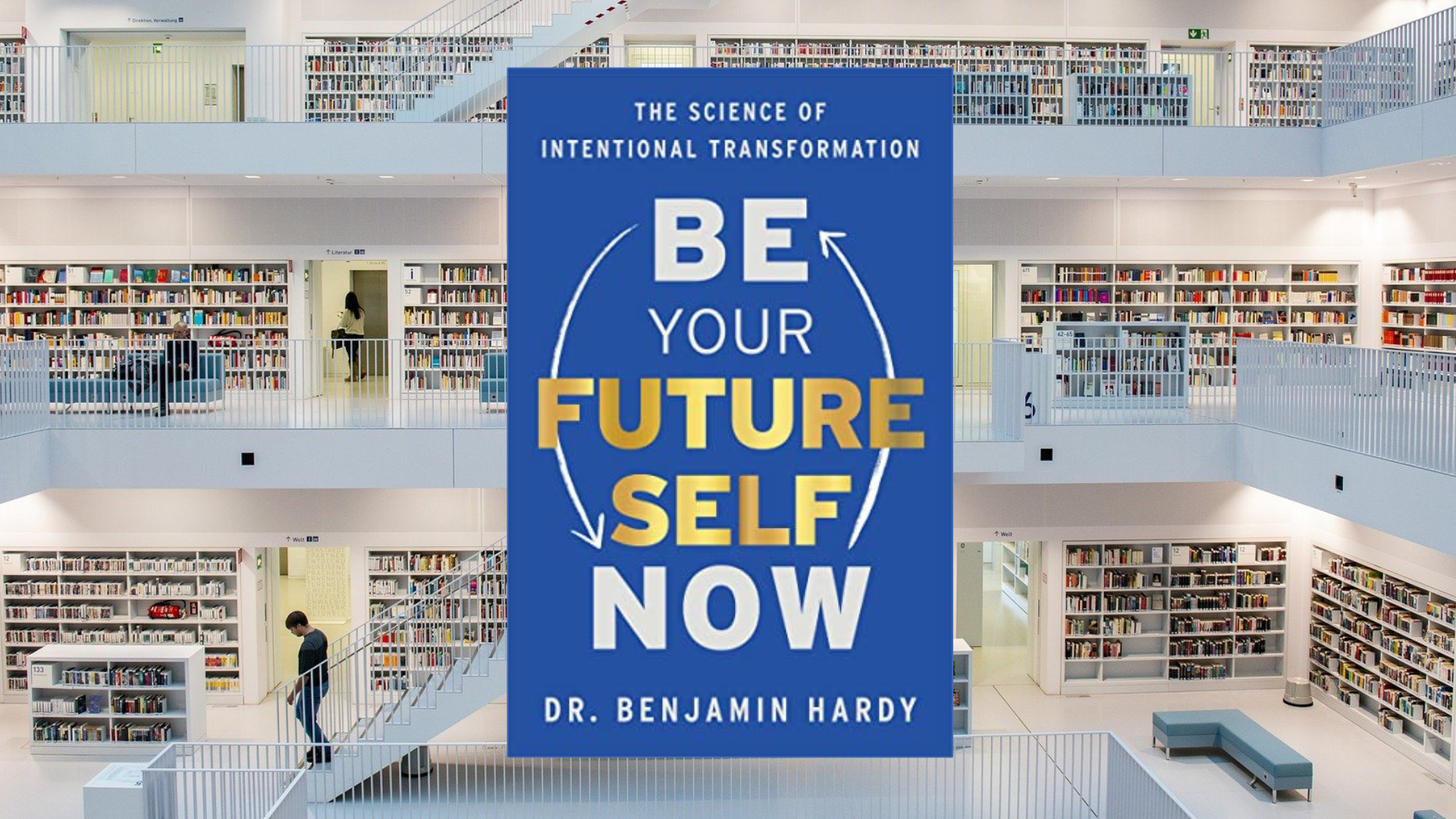
Be Your Future Self Now, by Dr. Benjamin Hardy:
Dr. Benjamin Hardy is the world's leading expert on the science of prospection and the Future Self concept.
Be Your Future Self Now is one of the absolute best introductions to the field, and inside this book, you're going to learn exactly why having a vision for your own future development is so critically important.
But you're also going to receive practical instruction on how to apply the science here and now to make your actual life better. Immediately. Today.
This is a rather long and detailed breakdown, but basically, who and what you're becoming - and your thoughts about it - directly affect the quality of your experience in the here and now.
Not only that but when your imagined Future Self directs your behavior rather than your behavior being directed by your past, that can be the shift that changes your entire life's trajectory.
Instead of running away from something you don't want (pain in your past), you'll be moving toward an exciting future that gives meaning to all of your subsequent days. To this day.
Sample Quotes from the Book:
“The first and most fundamental threat to your Future Self is not having hope in your future. Without hope, the present loses meaning. Without hope, you don't have clear goals or a sense of purpose for your life. Without hope, there is no way. Without hope, you decay."
“If you’re around people who have low expectations for you, you'll fall to those standards. If you're around people with high expectations, you'll rise to those standards."
“The more conscious you become of how everything you do right now impacts the person you are in the future, the better and more thoughtful your actions will be."
Read the Full Breakdown: Be Your Future Self Now, by Dr. Benjamin Hardy

Questions to Stimulate Your Thinking:
The quality of your questions determines the quality of your life. That's also how you get the absolute most out of any book that you decide to read:
You ask great questions the whole time - as though the book was on trial for its life.
Here in this section are a few questions that can help guide and stimulate your thinking, but try to come up with your own additional questions, especially if you decide to read this book the whole way through...
#1: "If you know what's possible, why would you settle for what's realistic?"
#2: "What do you love to do so much that you'd gladly give up sleep for?"
#3: "When was the last time you failed at something you tried your absolute best at? How long did it take you before you were able to get up and try again?"
#4: "Who are the naysayers in your life? Have they given you any proof or any indication that they know more about how you should live your life than you do?"
#5: "Do you have a dream, or a vision, that makes time slip away? That makes space slip away? That'd you give everything you have for, and would still feel as though you got the better end of the deal?"
"Judge a man by his questions, rather than by his answers."
-Voltaire
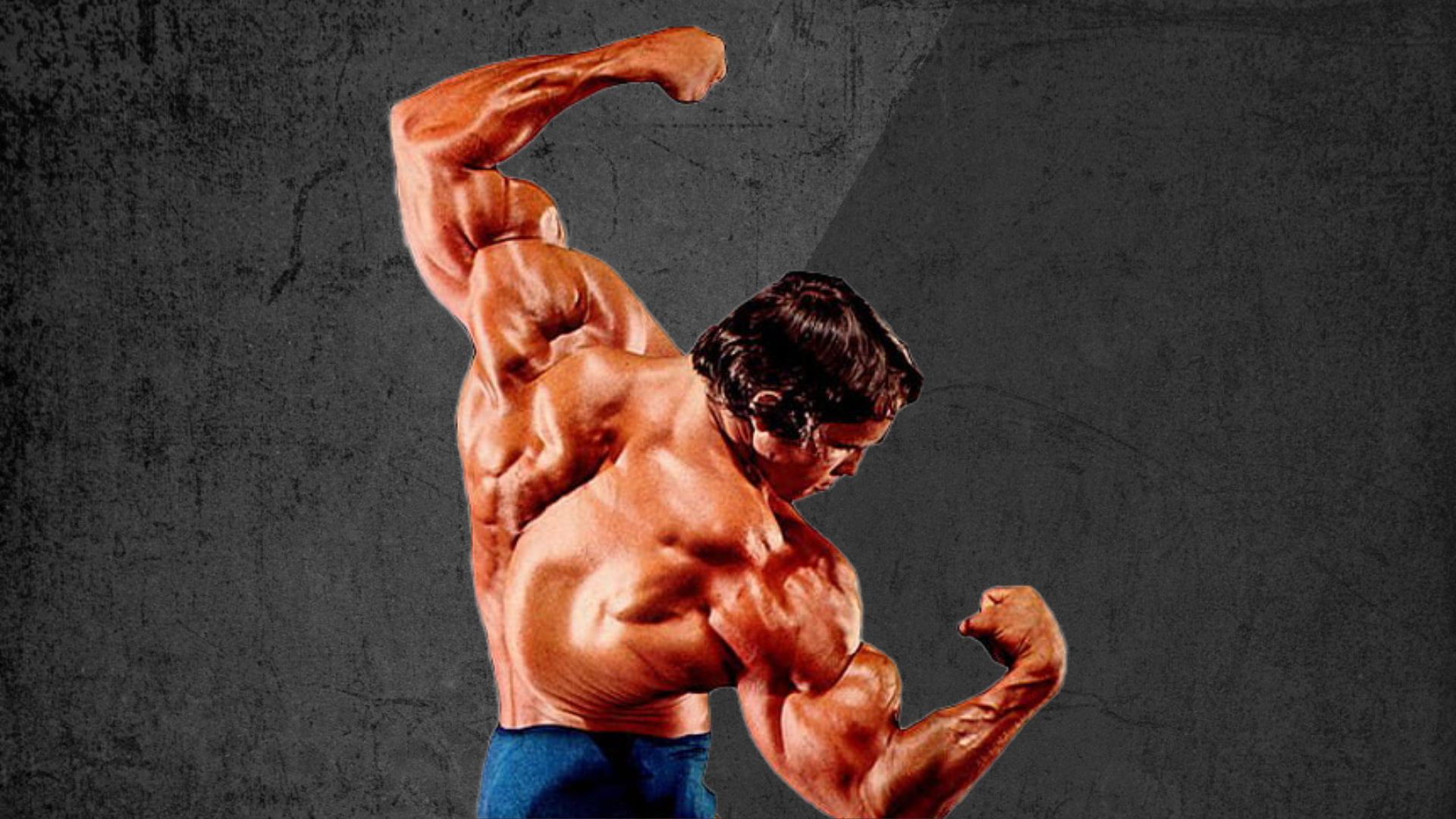
Action Steps:
So you've finished reading. What do you do now?
Reading for pleasure is great, and I wholeheartedly support it. However, I am intensely practical when I'm reading for a particular purpose. I want a result. I want to take what I've learned and apply it to my one and only life to make it better!
Because that's really what the Great Books all say. They all say: "You must change your life!" So here, below, are some suggestions for how you can apply the wisdom found in this breakdown to improve your actual life.
Please commit to taking massive action on this immediately! Acting on what you've learned here today will also help you solidify it in your long-term memory. So there's a double benefit! Let's begin...
#1: Set a Clear, Compelling Vision
If you don't have a clear destination, you're just going to keep wandering around you're not going to end up anywhere.
Now, it probably goes without saying that you don't have to be some bodybuilding world champion or have your sights set on growing some billion-dollar company. Your goals and your vision just have to be compelling to you.
Personally, my clear and compelling vision includes reading a ton of books (my goal is to read 10,000 books) and developing an extremely impressive physique, as well as inspiring millions of people to read more and get active, while growing my business. Those are elements of my clear and compelling vision, but each of us needs to come up with our own.
More than likely, your vision will involve gaining time freedom, financial freedom, and living a life of purpose, probably including mastery of some art or skill. Deep, fulfilling relationships are likely to feature prominently in your vision, and being of service drives more people than you'd think. But everybody's different.
Both words - clear and compelling - are critically important here, but I want to stress clarity for a moment. You have to be able to literally see your vision as it will be reflected in reality, just like what you're moving towards is sitting right in front of you.
The detailed specifics of your vision need to be visible, tangible in every sense, inside the theater of your mind. Visions are seen, felt. They live inside you right now, but they can - indeed, must exist in reality.
No one can bring them to life besides you, and so you need to make a promise - a self-promise - that you're going to do whatever it takes to turn your vision into reality.
#2: Increase Your Inputs
Speaking of doing whatever it takes, a helpful approach I take in my own life is to assume that it's going to be 10X harder, and that it's going to take 10X longer, and still commit to doing whatever it takes to make it happen, whatever "it" is.
A great book regarding this is called The 10X Rule, by Grant Cardone. Okay, fine, it's a good book, but it's got a great message. All you have to remember to do is take 10X the amount of action you think it will take to achieve your goals.
Commit to working 10X harder, for 10X longer, and 10X smarter, than everybody else. Massively increase your inputs, and never reduce your goal. The problem is never the goal. The goal is never too big. Your inputs - your actions - are too small. This is now a guiding principle of your life.
Arnold himself didn't just expect to be handed everything simply because he showed up. As he tells in the book, he was working his construction job during the day, working out 5 hours a day, taking acting classes in the evenings, learning everything he could about real estate - all these inputs, this ridiculous level of preparation and focus, whatever it took to reach the goal. To realize his vision.
#3: Advance Through the "Pain Period"
The pain period exists to allow us the opportunity to show the universe how badly we really want it. To prove that we want it as badly as we say we do. To back up our claims that we are who we say we are.
As mentioned in Key Idea #8 above, the pain period is where all growth occurs. That's true whether we're talking about building big muscles, building a big company, or building a big vision. There's no way around the pain and the sacrifice and the work. The only way out is through.
But here's the motivating part: the only way you can fail is if you quit! That's literally the only way that you can be stopped. It's virtually impossible to fail - just don't quit! Don't quit, and you cannot fail.
"The path to success is to take massive, determined action."
-Tony Robbins


About the Author:
Arnold Alois Schwarzenegger is an Austrian and American actor, businessman, filmmaker, former politician, and former professional bodybuilder known for his roles in high-profile action movies. He served as the 38th governor of California from 2003 to 2011 and was among Time's 100 most influential people in the world in 2004 and 2007.
Additional Resources:
Schwarzenegger.com | Main Website
After-School All-Stars | Nonprofit Organization
This Book on Amazon:
Be Useful, by Arnold Schwarzenegger
If You Liked This Book:
Total Recall, by Arnold Schwarzenegger
Wooden on Leadership, by John Wooden and Steve Jamison
Discipline is Destiny, by Ryan Holiday
Do Hard Things, by Steve Magness
Be Your Future Self Now, by Dr. Benjamin Hardy
Learn, Improve, Master, by Nick Velasquez
Discipline Equals Freedom, by Jocko Willink
Doing the Impossible, by Patrick Bet-David

